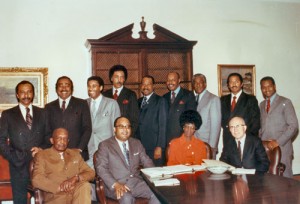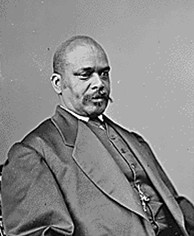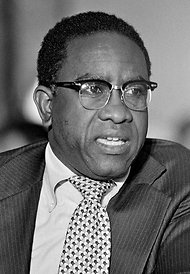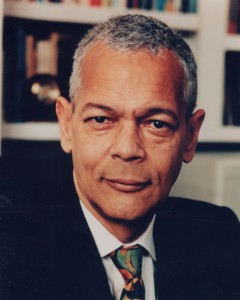Black History, Government

George Washington Murray
South Carolina Congressman George Washington Murray was born near Rembert, Sumter County, South Carolina, on September 22, 1853 to slave parents. He attended public schools, the University of South Carolina, and the State Normal Institute at Columbia, where he graduated in 1876.
After graduating, Murray taught school and worked as a lecturer for the Colored Farmers’ Alliance for 15 years. In 1890 he became an inspector of customs at the port of Charleston. Two years later in 1892, Murray, a Republican, was elected to represent South Carolina’s 7th Congressional District which included Charleston.
Murray took his seat in the Fifty-third Congress on March 4, 1893. He immediately focused his efforts on protecting black voting rights in the South at a time when growing numbers of black voters were being excluded from the polls. Murray was also a member of the Committee on Education. He also took a seat on the Committee on Expenditures in the Treasury Department.
(more…)
Black History, Firsts, Government

Henry A. Rucker
Mr. Rucker, born a slave, had been owned by the King family of Athens, Georgia (in-laws of Atlanta journalist Henry Grady). Following the Civil War, Mr. Rucker opened a barber shop on Decatur Street in Atlanta; attended Atlanta University; was a delegate to the Republican National Convention in Chicago, Illinois (1880); was appointed by the President Grover Cleveland as a clerk in the internal revenue collector’s office in Atlanta (1880-1885, 1889-1893).
He was later appointed to the position of Collector of Internal Revenue for the District of Georgia by President William McKinley. Henry Rucker was the only African American to receive such an appointment. He served from 1896 to 1910. Mr. Rucker was active in the Niagara Movement and the NAACP.
He married Annie Eunice Long (1865-1933) and had eight children: Henry, Jr., Elizabeth (Bessie), Lucy Lorene, Jefferson, Neddie, Hazel, Alice, and Ann L. The family resided on Piedmont Avenue.
Black History, Government

The 13 founding members of the CBC in the early 1970s. Standing L–R: Parren Mitchell (MD), Charles B. Rangel (NY), Bill Clay, Sr. (MO), Ron Dellums (CA), George Collins (IL), Louis Stokes (OH), Ralph Metcalfe (IL), John Conyers (MI), and Walter Fauntroy (DC). Seated L-R: Robert Nix, Sr. (PA), Charles Diggs (MI), Shirley Chisholm (NY), and Gus Hawkins (CA).
The Congressional Black Caucus is an organization representing the black members of the United States Congress. Membership is exclusive to African-Americans, and its chair in the 112th Congress is Representative Emanuel Cleaver of Missouri.
The caucus describes its goals as “positively influencing the course of events pertinent to African-Americans and others of similar experience and situation”, and “achieving greater equity for persons of African descent in the design and content of domestic and international programs and services.” (more…)
Black History, Government

Oscar James Dunn, Lieutenant Governor of Louisiana 1868-1871
Oscar James Dunn (1826 – November 22, 1871) was one of three African Americans who served as a Republican Lieutenant Governor of Louisiana during the era of Reconstruction. In 1868, Dunn became the first elected black lieutenant governor of a U.S. state. He ran on the ticket headed by Henry Clay Warmoth, formerly of Illinois. After Dunn died in office, then-state Senator P. B. S. Pinchback, another black Republican, became lieutenant governor and thereafter governor for a 34-day interim period.
On December 22, 1866, Dunn testified before a select committee appointed to investigate the New Orleans Riot of July 30, 1866. He told the committee that he was “born in New Orleans in 1826 and was about forty-one years old”. His parents were James and Maria Dunn. His father, James Dunn of Petersburg, Virginia, had been emancipated in 1819 by James H. Caldwell in New Orleans. James Dunn became a free man of color and later emancipated his wife, Maria, and their two children, Oscar and Jane, in 1832. James Dunn worked as a carpenter for James H. Caldwell (founder of the St. Charles Theatre and New Orleans Gas Light Company); Maria Dunn ran a boarding house for actors and actresses that came to perform at the Caldwell theatres. (more…)
Black History, Business, Government

William E. Sauro/The New York Times
Andrew F. Brimmer in 1974, shortly after he resigned from the Fed board.
Andrew F. Brimmer, a Louisiana sharecropper’s son, was the first black member of the Federal Reserve Board. Dr. Brimmer, an economist, held a number of high-ranking posts in Washington and taught at Harvard, but the economic conditions of poor, powerless, uneducated blacks was an abiding concern. He spoke about what he called the “schism� between blacks who were educated and had marketable skills and those who did not. In later years he spoke frequently about how government policies no longer supported programs to help blacks enter the economic mainstream.
Dr. Brimmer was the assistant secretary of commerce for economic affairs when President Lyndon B. Johnson named him to the Fed board in 1966.
At the time, the Federal Reserve was bitterly divided over monetary policy. The chairman, William McChesney Martin Jr., threatened to resign if Mr. Johnson appointed a liberal who would vote in favor of lower interest rates. (more…)
Black History, Civil Rights, Government, Politics

Julian Bond
HORACE JULIAN BOND (Jan. 14, 1940 – Aug. 15, 2015), U.S. legislator and black civil-rights leader, best known for his fight to take his duly elected seat in the Georgia House of Representatives. The son of prominent educators, Bond attended Morehouse College in Atlanta (B.A., 1971), where he helped found a civil-rights group and led a sit-in movement intended to desegregate Atlanta lunch counters.
In 1960 Bond joined in creating the Student Nonviolent Coordinating Committee (SNCC), and he later served as communications director for the group. In 1965 he won a seat in the Georgia state legislature, but his endorsement of a SNCC statement accusing the United States of violating international law in Vietnam prompted the legislature to refuse to admit him. (more…)





